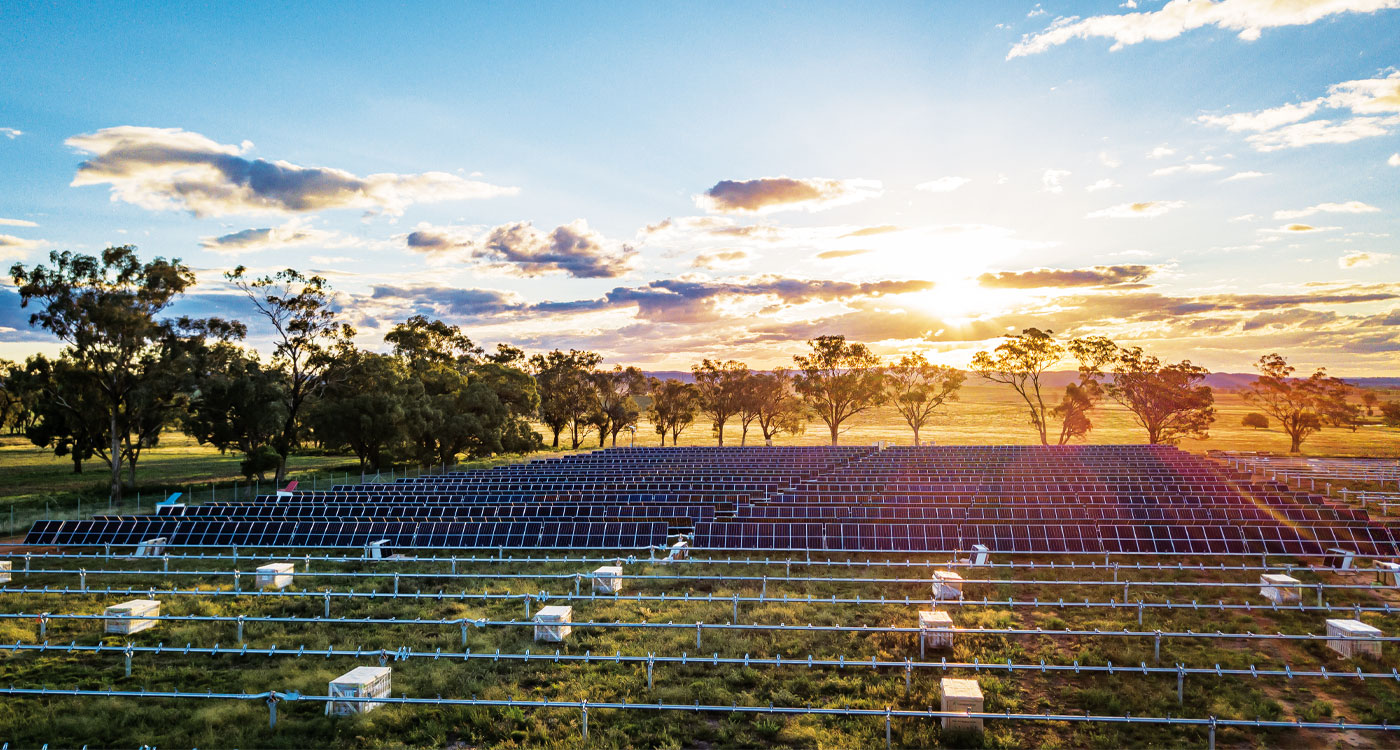
An Ambition for the climate
Strategy
To curb the increase in its greenhouse gas emissions, the Group has set ambitious goals. They are coupled with an action plan to reduce the impact of its activities and those of its clients through concrete solutions.
By Émilie Dupas
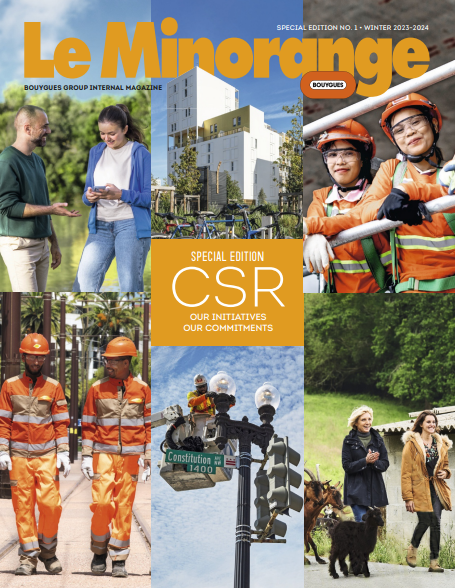
DISCOVER OUR MINORANGE SPECIAL EDITION
SPECIAL CSR
“At Bouygues, we address essential needs, for housing, transportation, communication, news and entertainment. These are all indispensable and will continue to be so, but how we address these needs, our ways of working and the types of products and services that we offer will change (…) Energy, digital and industrial transformations are well underway, and we must support this process. This is why we acquired Equans, a leader in energies and services, to provide us with additional solutions” Edouard Bouygues, the Bouygues group’s Deputy CEO in charge of telecommunications development, CSR and innovation, explained in an interview on CSR and the climate.
The continually increasing concentration of CO2 in the atmosphere contributes to global warming. This phenomenon has an impact on ecosystems and threatens social peace and the global economy. According to scientific experts, limiting the temperature increase to +1.5°C is no longer an option, but a necessity, and this objective is mobilizing all of society, including the business world.
“Inaction will cause temperatures to rise by 2°C by 2050 and by 2.5°C to 3°C by the end of the century. More effective action could stabilise global temperatures within 20 years, so that we can avoid catastrophes for our ecosystems, biodiversity, food security, infrastructures and health. It is essential to act on emissions and adapt. Transformation is essential for every single human activity” warns Valérie Masson-Delmote, a climate scientist and palaeontologist, in an interview on CSR and the climate.
The Group’s first step was recognising the impact of its carbon footprint and the role it plays in supporting the climate very early on. It instituted a decarbonization policy over fifteen years ago, positioning itself as a pioneer in designing positive-energy buildings and carrying out large-scale energy renovation programs for residential and commercial properties. “We constructed the first positive-energy building in 2011, developing a Positive Economy Hybrid Building, which combines environmental performance with cost-effectiveness,” states Edward Bouygues.

Our employees are our greatest asset for crafting solutions that have a positive impact
DEPUTY CEO OF TELECOM DEVELOPMENT, CSR AND Innovation
In 2020, it adopted a climate strategy, supported by a budget of 2.2 billion euros for the period 2022-2024. In line with the Paris Agreement (2015), the objectives of this strategy commit each business segment to reduce its upstream (scopes 1, 2, and 3a) and downstream (scope 3b)1 greenhouse gas emissions to guide its overall trajectory to 2030.
In 2022, the Group received a B rating from CDP, which identifies the companies most active in the fight against climate change, placing it above the global average for construction companies. Within the next twelve months, five of the six Bouygues business segments will have had their decarbonization objectives validated by the Science Based Target initiative (SBTi)2, and Equans will measure its global carbon footprint to further refine its climate strategy.
1. Excluding Equans.
2. The Science Based Targets intiative (SBTi) comes out of a partenership between the Carbon Disclosure Project (CDP), the United Nations Global Compact, the Word Resources Institute (WRI), and the Word Wildlife Fund. It verifies the alignment of companies’ greenhouse gas reduction goals with climate science date.
But beyond the indicators, a transformation of the Group and its businesses is in progress, paving the way for new and more sustainable business models. As Valérie Masson-Delmote states, “it is possible to cut global emissions in half by 2030, if we are innovative, support energy efficiency and preserve ecosystems.”
Edward Bouygues and the Group agree: “Innovation is vital if we are to address the needs of our clients, society and different geographies. Speeding up action in the face of climate change, adopting new trends and emerging practices, getting to grips with technological transformations and developing sustainable business models are all key priorities. Our employees are our greatest asset.”
OUT Footprint
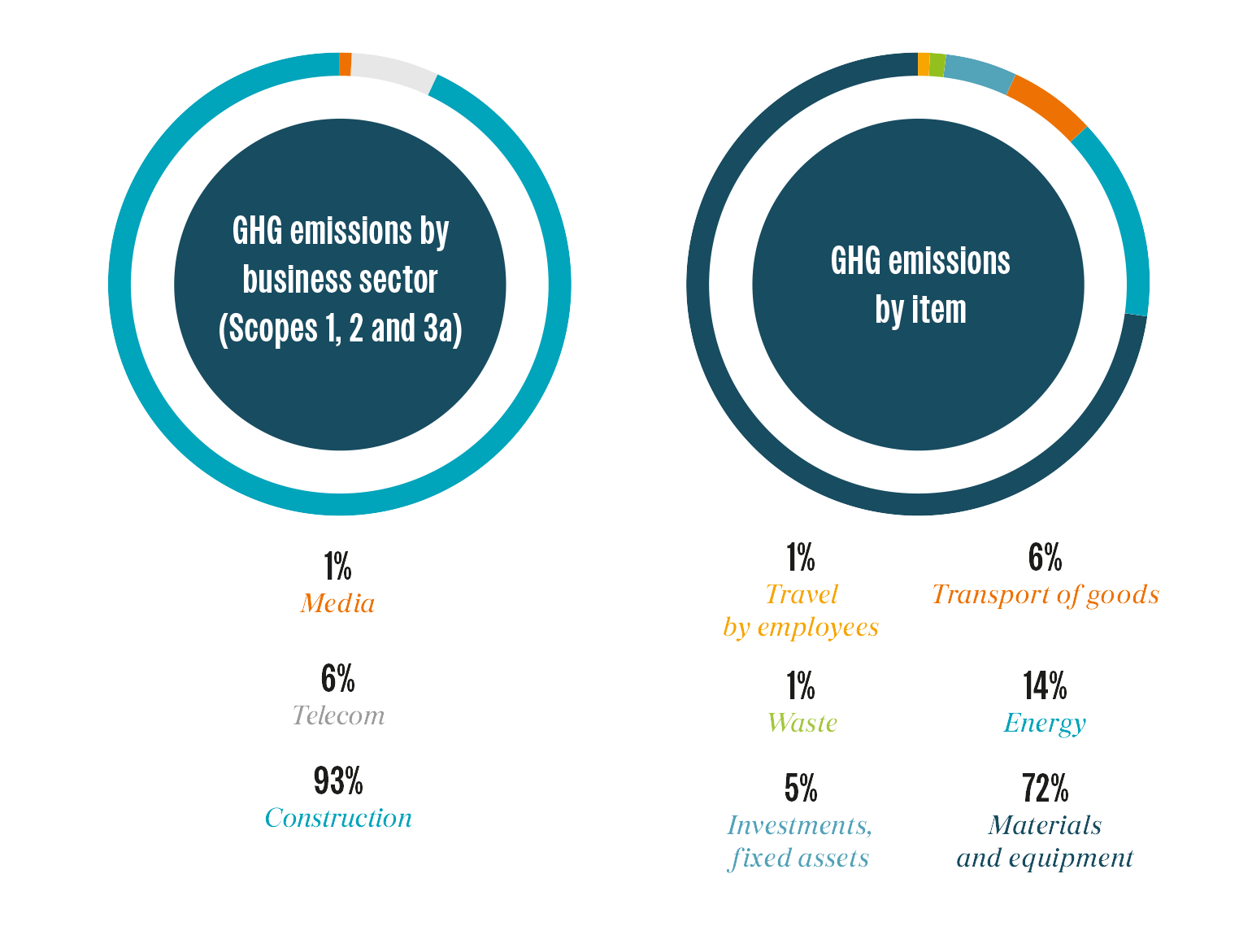
our goals
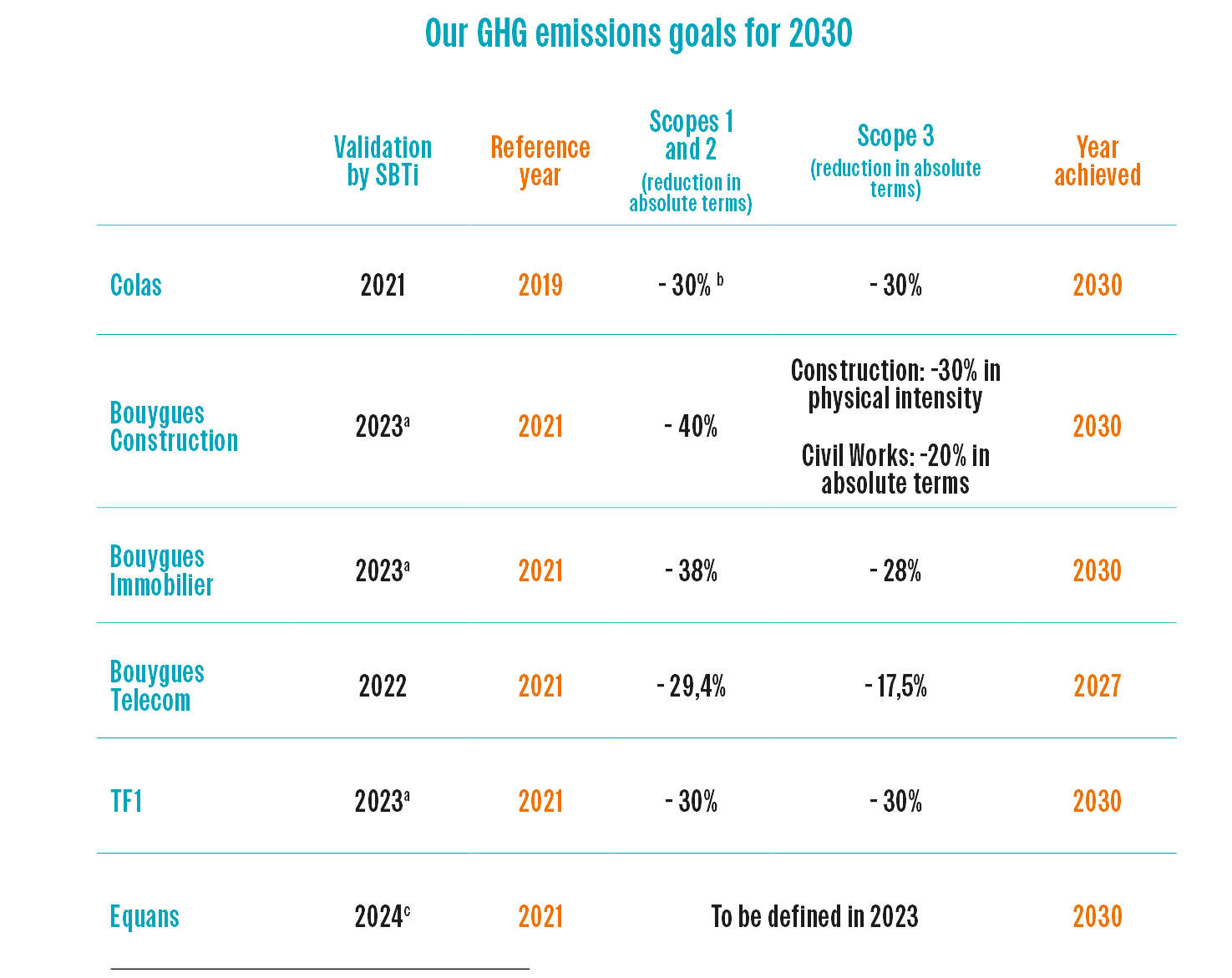
1. Scope 1 : Direct emissions from the compagny ; scope 2 : Indirect emissions related to energy consumption; scope 3a : lCarbon emissions from the entire upstream value chain contributing to the company’s production (e.g., suppliers) ; scope 3b : Carbon emissions related to the marketing and use of the company’s products and services. This Scope currently applies only to Bouygues Immobilier, Bouygues Telecom and Bouygues SA.
Low-carbon construction projects
The construction sector is responsible for approximately 30 percent of global greenhouse gas emissions1 and accounts for 94 percent of the emissions of the Bouygues group. It is thus regarded as one of the key factors to achieving the goals set by the Group in its climate strategy.
At every stage of a project’s lifecycle, from design and execution to operation, maintenance, and rehabilitation, Bouygues Construction, Bouygues Immobilier, and Colas implement sustainable solutions having the lowest possible environmental impact. Efforts are also made to use bio-based materials and to begin applying a circular economy approach. The energy efficiency of buildings is optimized.
The Group also provides soft mobility solutions (e.g., metros and tramways, bicycle paths, electric-vehicle charging stations, green hydrogen stations) and participates in the development of low-carbon energy infrastructures around the world (offshore wind projects, solar farms, state-of-the-art nuclear power plants).
1. Source : International Energy Agency
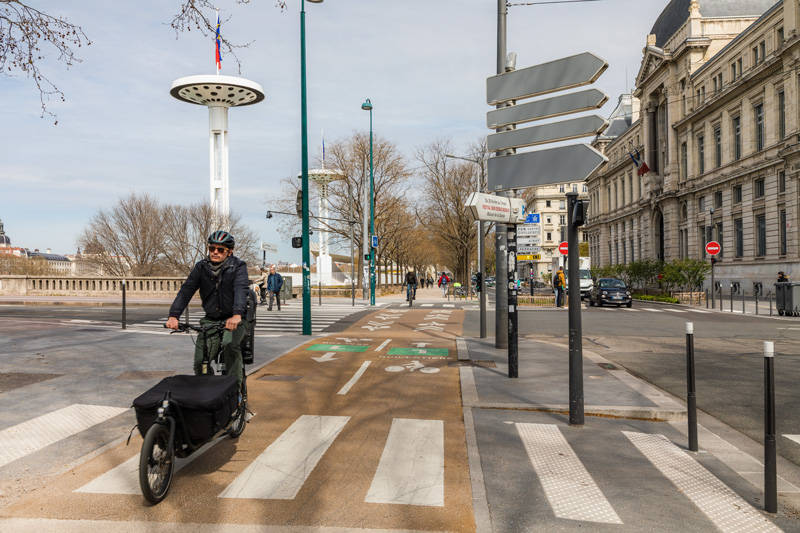
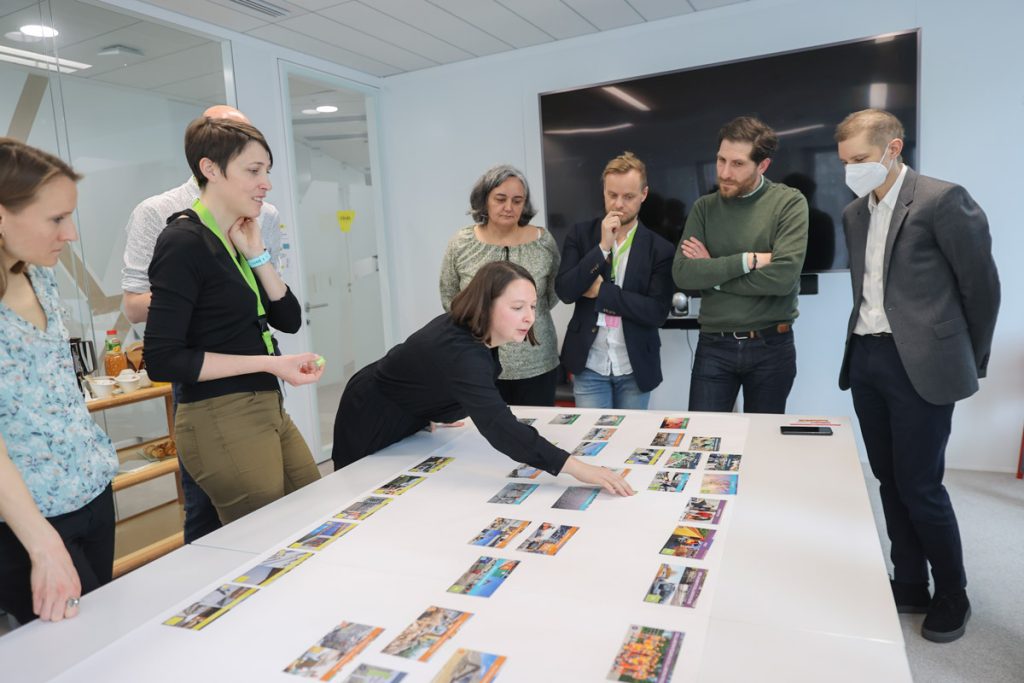
€2.2BN
allocated to carbon footprint reduction (2022-2024)
17,000
employees trained by 400 workshop leaders at Climate Fresco
30%
of senior executives had participated in Prosperity Without Carbon training by end-2022
TRANSITIONing to a low-carbon world with equans
Delivering effective ways for buildings, cities, and industries to save energy is one of Equans’ primary activities. The company also aims to expand the use of electricity, as seen with the new metro in Montreal and to strengthen its position across the entire energy value chain by developing renewable energy infrastructures.
.
subtainable solutions in telecoms and media
TF1 has a small carbon footprint because of the nature of its activities, but the media group is committed to raising public awareness through ecology-focused programs. It also intends to develop eco-production. Bouygues Telecom, meanwhile, is working to improve the energy efficiency of its sites and promote the eco-design and refurbishment of smartphones.